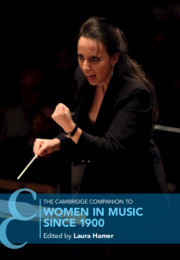Book contents
- The Cambridge Companion to Women in Music since 1900
- Cambridge Companions to Music
- The Cambridge Companion to Women in Music since 1900
- Copyright page
- Dedication
- Contents
- Figures
- Boxes
- Notes on Contributors
- Preface
- Abbreviations
- Part I The Classical Tradition
- Part II Women in Popular Music
- Part III Women and Music Technology
- 13 Case Studies of Women in Electronic Music: The Early Pioneers
- 14 The Star-Eaters: A 2019 Survey of Female and Gender-Non-Conforming Individuals Using Electronics for Music
- In Her Own Words: Practitioner Contribution 3
- Part IV Women’s Wider Work in Music
- Appendix: Survey Questions for Chapter 14, The Star-Eaters: A 2019 Survey of Female and Gender-Non-Conforming Individuals Using Electronics for Music
- Select Bibliography
- Index
- References
14 - The Star-Eaters: A 2019 Survey of Female and Gender-Non-Conforming Individuals Using Electronics for Music
from Part III - Women and Music Technology
Published online by Cambridge University Press: 17 April 2021
- The Cambridge Companion to Women in Music since 1900
- Cambridge Companions to Music
- The Cambridge Companion to Women in Music since 1900
- Copyright page
- Dedication
- Contents
- Figures
- Boxes
- Notes on Contributors
- Preface
- Abbreviations
- Part I The Classical Tradition
- Part II Women in Popular Music
- Part III Women and Music Technology
- 13 Case Studies of Women in Electronic Music: The Early Pioneers
- 14 The Star-Eaters: A 2019 Survey of Female and Gender-Non-Conforming Individuals Using Electronics for Music
- In Her Own Words: Practitioner Contribution 3
- Part IV Women’s Wider Work in Music
- Appendix: Survey Questions for Chapter 14, The Star-Eaters: A 2019 Survey of Female and Gender-Non-Conforming Individuals Using Electronics for Music
- Select Bibliography
- Index
- References
Summary
Moving forward to the later twentieth and early twenty-first centuries, Chapter 14 provides a survey of contemporary female and gender-non-conforming artists using electronics for music. Margaret Schedel and Flannery Cunningham highlight how greater access to affordable means to manipulate digital sound from the autonomy of personal computers – away from difficult-to-access studios staffed by technicians and equipped with complex technology, which were previously largely the domain of male ‘experts’ – has opened up electronic music to a wider demographic of people (in terms of gender, race, and class). Taking an ethnographic approach which draws upon questionnaire material from twenty-four respondents variously identifying as composers, sound artists, instruments builders, and programmers, this chapter explores some of this diversity through the artists’ own words.
Keywords
- Type
- Chapter
- Information
- The Cambridge Companion to Women in Music since 1900 , pp. 213 - 227Publisher: Cambridge University PressPrint publication year: 2021



